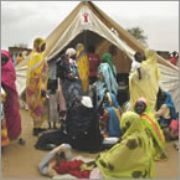Sudan expels two aid group directors for statements on Darfur
By MOHAMED OSMAN, Associated Press Writer
KHARTOUM, Sudan, Nov 29, 2004 (AP) — Sudan on Monday ordered the expulsion of the country directors of two humanitarian organizations, saying they violated a law against interfering in domestic affairs with their statements to the press about renewed violence in Darfur.

|
|
Save the Children’s Supplementary Feeding Center in Tewila, North Darfur. |
The expulsion order, which accused Save the Children UK and Oxfam International of sending “signals of support” to rebels, was a troubling echo of past difficulties between aid workers and Sudan’s government, which had largely kept international groups out of Darfur for more than a year after violence erupted there.
The chief U.N. envoy for Sudan, Jan Pronk, has pressed the government to reverse its order and is awaiting a response, said U.N. spokeswoman Radhia Achouri.
“We are very concerned about this action, particularly given the role of the two NGOs in question. They were among the first to make it to Darfur and have played a major role in alleviating the suffering of people in Darfur and across Sudan,” she told The Associated Press. “We do believe they have a tremendous role to play and need to be maintained in Sudan.”
The Ministry of Humanitarian Affairs said recent press releases by the two organizations had breached the law on nonintervention in the country’s political, ethnic or sectarian issues.
“It has been decided to consider you persona non grata for the management of your organization in Sudan,” read the identical expulsion letters. “Therefore, you must leave the country within 48 hours, as of the date of this decision.”
Kate Haiff, Sudan country director for Save the Children UK, declined to comment on the order, and Oxfam officials in Khartoum could not be reached.
In Britain, the headquarters of both agencies confirmed the country directors had received expulsion orders and said they were seeking clarification.
The Sudanese government has a history of tension with aid groups, which have previously accused Khartoum of unnecessarily restricting access to the displaced people in Darfur, the western region of Sudan. A rebellion there has provoked a counterinsurgency campaign that has killed thousands of people and displaced about 1.8 million inhabitants.
Although the rebellion began in February 2003, the government did not ease restrictions on aid groups until May 2004, as the world condemned the suffering of the displaced and as other countries, particularly the United States, began to demand transparency and threaten to take action. Sudan argued it had denied access for security reasons.
Aid groups now in Darfur have reported this month on a fresh outbreak of violence that followed a Nov. 9 cease-fire agreement between rebels and the government.
The Ministry of Humanitarian Affairs singled out three press releases that it said interfered in Sudanese domestic matters and should have instead been handled through the government rather than through the media.
“The Ministry of Humanitarian Affairs views the statements issued by those two organizations as sending signals of support to the outlaws and rebels for continuation of the war,” the ministry said in a press release carried by the official Sudan News Agency.
A Nov. 19 statement by Oxfam condemned a U.N. Security Council resolution for its “weakness” on Darfur; another on Nov. 22 called on the European Union to exert pressure on Sudan to stop the violence.
“Rejecting the resolutions of the U.N. Security Council that calls for peace realization in Sudan simply means that organization wants the continuation of war in Darfur,” the ministry said.
It also said that calling for EU pressure on Sudan was “sending signals to the rebels to continue war.”
The ministry also referred to a Nov. 21 press release by Save the Children UK that accused the government of bombing a site in the North Darfur town of Tawilla without first waiting for confirmation from African Union cease-fire monitors. It said the aid group’s report of both sides breaking the cease-fire did not distinguish between the rebels and the police who were protecting civilians.
